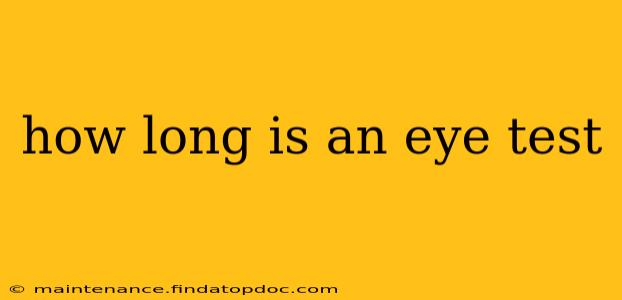How Long Is an Eye Test? A Comprehensive Guide
The length of an eye exam can vary significantly depending on several factors. There's no single answer to "How long is an eye test?", as it can range from a quick check-up to a much more in-depth examination. This comprehensive guide will break down the factors influencing the duration and what to expect during your appointment.
What Factors Influence the Length of an Eye Exam?
Several elements contribute to the overall time spent during your eye examination. These include:
-
Reason for the visit: A routine check-up for a healthy individual will naturally be shorter than an exam for someone experiencing vision problems, needing a prescription update for a significant change, or undergoing testing for a specific eye condition. Suspected glaucoma, macular degeneration, or other serious conditions necessitate a more extensive evaluation.
-
Type of eye exam: A basic vision screening might only take 15-20 minutes, focusing primarily on visual acuity. A comprehensive eye exam, which includes a dilated eye exam, can easily extend to an hour or more. Specialized tests, such as those for glaucoma or macular degeneration, can add considerable time to the appointment.
-
Doctor's approach and practice efficiency: Different ophthalmologists and optometrists may have different approaches and levels of efficiency. Some may work more quickly than others, and the overall workflow of the practice can impact wait times and exam duration.
-
Patient factors: Patient cooperation and communication can also influence the duration. If a patient has difficulty understanding instructions or answering questions, the process may take longer.
What Happens During a Routine Eye Exam?
A typical comprehensive eye exam usually involves these steps:
- Visual acuity test: This measures your sharpness of vision using an eye chart.
- Refraction: This determines your refractive error (nearsightedness, farsightedness, astigmatism) to determine the correct prescription for glasses or contact lenses.
- Eye muscle assessment: This checks for eye alignment and coordination.
- Intraocular pressure measurement: This checks for glaucoma.
- External eye examination: This involves a visual inspection of the eyelids, conjunctiva, and cornea.
- Dilated eye exam: This exam, often involving eye drops to widen the pupils, allows for a detailed examination of the retina, optic nerve, and blood vessels. This is crucial for detecting many eye diseases.
How Long is a Basic Eye Exam?
A basic eye exam, often focusing solely on visual acuity and refractive error, might only take 15-20 minutes. This type of exam is usually sufficient for a simple prescription renewal if your vision hasn't changed significantly.
How Long is a Comprehensive Eye Exam?
A comprehensive eye exam, including all the tests mentioned above, generally lasts 45 minutes to an hour or more. The dilation process alone can add significant time as your eyes need time to dilate and then to recover afterwards.
What if I Need More Specialized Tests?
If your ophthalmologist or optometrist suspects a specific eye condition, further testing might be necessary. These additional tests can significantly increase the overall duration of your appointment, potentially extending it to several hours. Examples of specialized tests include:
- Optical coherence tomography (OCT): A non-invasive imaging technique used to diagnose macular degeneration and other retinal conditions.
- Visual field test: This measures your peripheral vision.
- Angiography: This involves injecting a dye to visualize blood vessels in the eye.
Can I Get a Shorter Eye Exam?
While a shorter, more basic exam is possible for prescription renewals with minimal vision changes, a comprehensive evaluation is essential for early detection of eye diseases and overall eye health. Skipping crucial tests to save time can be detrimental to your long-term eye health.
In conclusion, the length of your eye test is highly variable. Always communicate openly with your eye doctor about any concerns you have and allow ample time for a thorough examination to ensure your eye health is properly addressed.
